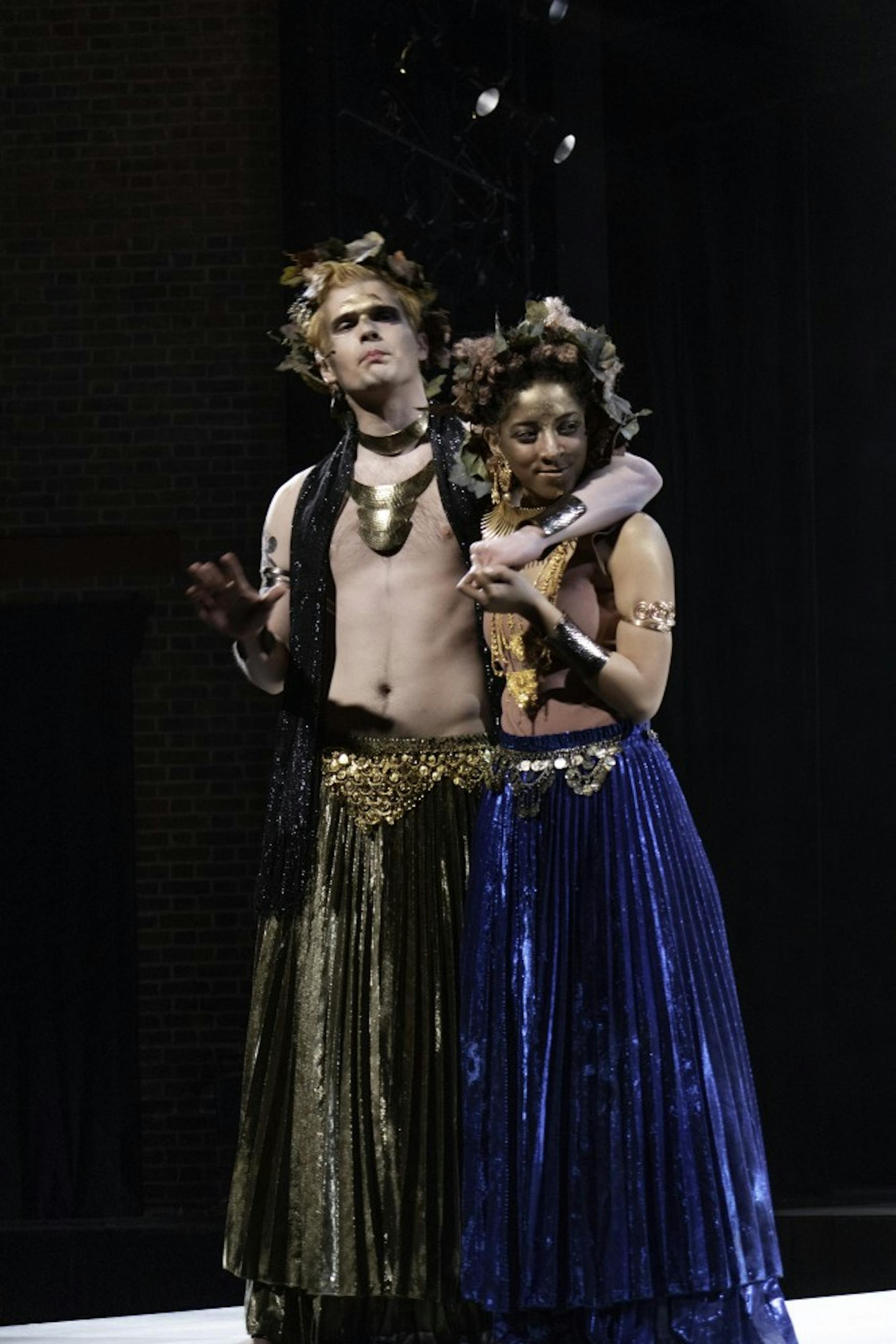Greek Mythology with a modern taste
This past Thursday, I attended the Department of Theater Arts’ production of “The Bacchae,” which tells the story of Dionysus, son of Zeus and Semele, and his revenge against Pentheus and all others who have slandered his name and denied his status as a god. As someone with very little knowledge of Greek mythology — I haven’t even seen the Percy Jackson films — the play was captivating. Before the show even started, the set design immediately stood out. Assistant Professor of Theater Arts Cameron Anderson (THA) and all those involved in creating the backdrop produced a remarkable work that alluded to what was to come from the performance. The remarkable nature of the set became more evident when Dionysus, played by Rose Archer ’20 and Dan Souza ’19 entered the stage and climbed on the crafted walls to proclaim their status as the god Dionysus. In addition to the set design, the musical numbers were well executed, as the chorus took the stage and the aisles to serenade the crowd. Daniel Rodriguez, Stephanie Fleischmann and Daniel Kluger created melodic accompanying pieces that enhanced the theatrical experience. The band was also an integral part of the musical ensemble; from the conductor to the violin, each individual successfully generated the mood that aided in carrying the story along.

MIX OF TIME: Giving modern costumes to some of the actors gave a unique vibe to the production.
The element of the play that I enjoyed the most was the decision to have two individuals playing Dionysus, a choice that added depth to the character as the play tackled the fluidity of gender as one of its many themes. While Archer and Souza complimented each other well and performed as one, they still retained their individuality — making Dionysus the complex character that he is. For example, during one scene Dionysus has women fawning over him and the differences in Archer and Souza’s actions demonstrate the diversity of the god’s personality, one that embraces sexuality and is nurturing at the same time. Similarly, Ben Astrachan ’19 played the role of Pentheus and managed to embody the character’s strict and dutiful nature to the citizens of Thebes. Norma Stobbe ’20, Alex Jacobs ’14 and Rachel Greene ’20 also brought life to their characters. Greene, especially, delivered a powerful performance as Agave upon the realization that she had slaughtered her son, Pentheus, and not a lion as she had assumed. Again, another nod to the multiple facets of the characters of “The Bacchae”. Just as the wrath of Dionysus saw no end, neither did the talent displayed on the stage.

HARD WORK BACKSTAGE: The visual effect of the show is breathtaking, and the credit goes to the stage production team.
Another aspect that elevated the performance was the costume design. Renowned costume designer Olivera Gajic, assistant costume designer Tyffany English ’19 and all of the talented students involved in costume construction and dressing did a phenomenal job at incorporating modern aspects to the ancient Greek tragedy. One such example was the appearance of Pentheus and his soldiers, played by Otis Fuqua ’19 and Anderson Stinson III ’21. Juxtaposing Dionysus and the people of Thebes, Pentheus was dressed in a suit and coat, and his soldiers were also dressed in more modern attire. This reinforced the strict nature of Pentheus’s character and his dedication to retaining law and order. Additionally, the gaudy attire worn by Dionysus when he revealed himself to Agave elucidated the god’s divinity and his desire for people to enjoy a more lavish lifestyle.

GREEK MYTHOLOGY: The vertical set that actors climb on helped address the relationship between god and humans.
The production of “The Bacchae” was extremely well done and all those that aided in bringing the work to the stage are worthy of all the praise and recognition for their hard work. It was the first production that I have seen during my time at Brandeis — and it surely was not one to miss. The renewal of the classic tragedy made the work of Euripides enjoyable for even those that are not as familiar with mythology. Director Prof. Dmitry Troyanovsky ’98 (THA) and Prof. Joel Christensen ’01, who translated the play from ancient Greek to English, produced a hit that is sure to have entertained all that had the pleasure of attending.

ONE GOD, TWO BODIES: A creative choice of the production was to have an actor and an actress to portray two sides of the character.



Please note All comments are eligible for publication in The Justice.